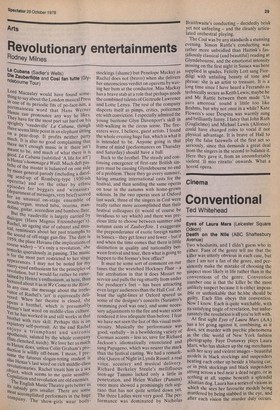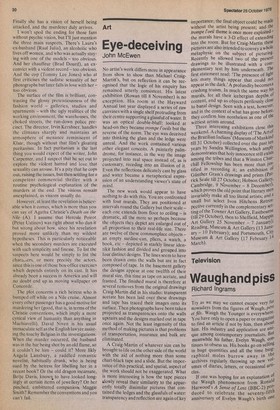Cinema
Conventional
Ted Whitehead
Eyes of Laura Mars (Leicester Square Odeon) Death on the Nile (ABC Shaftesbury Avenue) Two whodunits, and I didn't guess who in either. Fans of the genre tell me that the killer was utterly obvious in each case, but then I am not a fan of the genre, and persistently make the mistake of choosing the suspect most likely in life rather than in the conventions of the genre. Convention number one is that the killer be the most unlikely suspect because it is either impossible or unthinkable that he/she should be guilty. Each film obeys this convention. Now I know. Each is quite watchable, with its satisfying tingle of revelation, but unfortunately the revelation is all you're left with.
At first sight Eyes of Laura Mars (AA) has a lot going against it, combining, as it does, sex murder with psychic phenomena in the chic world of New York fashion photography. Faye Dunaway plays Laura Mars, who has shaken up the rag merchants with her sexy and violent images — beautiful models in black stockings and suspenders beating each other up beside a blazing car, or in pink stockings and black suspenders strung across a bed near a dead negro, or in nothing at all, supine beneath a splendid Alsatian dog. Laura has a series of visions in which she sees her favourite models being murdered by being stabbed in the eye, and after each vision the murder duly occurs. Finally she has a vision of herself being attacked, and the murderer duly arrives.
I won't spoil the ending for those fans without psychic vision, but I'll just mention the three main suspects, There's Laura's ex-husband (Raul Julia), an alcoholic who lives off women, and who was actually staying with one of the models too obvious. And her chauffeur (Brad Dourif), an exconvict with a violent record too obvious. And the cop (Tommy Lee Jones) who at first criticises the sadistic sexuality of her photographs but later falls in love with hertoo obvious.
The surface of the film is brilliant, contrasting the glossy pretentiousness of the fashion world galleries, studios and apartments with the ugly realities of the working environment, the warehouses, the choked streets, the run-down police pre cinct. The director, Irvin Kershner, handles the climaxes sharply and maintains an atmosphere of menance reminiscent of Klute, though without that film's gloating puritanism. In fact puritanism is the last thing you would expect of the writer, John Carpenter, and I suspect that he set out to explore the violent hatred and love that sexuality can arouse. It's a pity that he cops out, raising the issues, but then settling for a competent commercial thriller with a routine psychological explanation of the murders at the end. The visions remain unexplained, as visions usually do.
However, at least the revelation is believable when it comes, which is more than you can say of Agatha Christie's Death on the Nile (A). I assume that Hercule Poirot (Peter Ustinov) was right about who dun it but wrong about how, since his revelation proved more unlikely than my wildest hypotheses. This is particularly noticeable when the secondary murders are executed with such simplicity and finesse. To list the suspects here would be simply to list the chara,ters, or more precisly the actors, since this is one of those box-office exercises which depends entirely on its cast. It has already been a success in America and will no doubt end up as moving wallpaper on Concorde.
The plot concerns a rich heiress who is bumped off while on a Nile cruise. Almost every other passenger has a good motive for murdering her (good, that is, in terms of the Christie conventions, which imply a more cynical view of humanity than anything in Machiavelli). David Niven is his usual immaculate self as the English lawyer assist ing the touchy Belgian in the investigations.
When the murder occurred, the husband was in the bar being shot by an old flame, so it couldn't be him could it? More likly Angela Lansbury, a raddled romantic novelist; habitually drunk, who is being sued by the heiress for libelling her in a recent book? Or the old dragon incarnate, Bette Davis, known_ to have looked longingly at certain items of jewellery? Or her pinched, embittered companion% Maggie Smith? Remember the conventions and you can't fail.







































 Previous page
Previous page